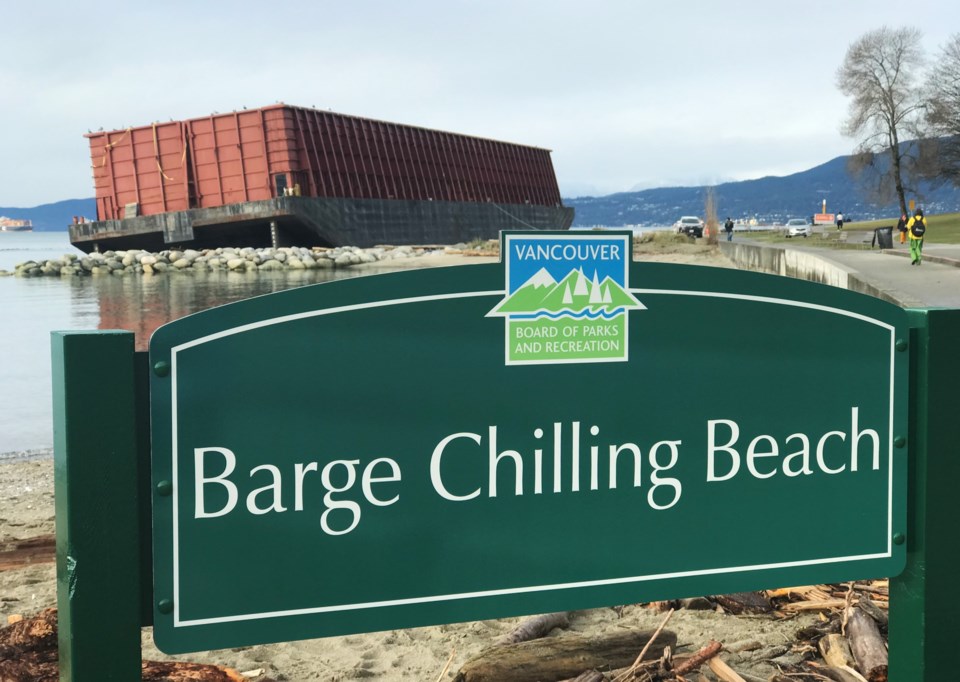Staff at the Vancouver Board of Parks and Recreation spent 18 hours producing and promoting the Barge Chilling Beach sign last December, a month after Sentry Marine Towing’s barge washed ashore, a 17-page internal communications report reveals.
They briefly considered commercializing the Sunset Beach oddity, when they discovered someone had called it Barge Chilling Park on a Google map, a nod to Guelph Park’s sculpture-inspired Dude Chilling Park sign.
“Maybe we need to do some swag?” wrote general manager Donnie Rosa, in a Dec. 13 email obtained under a freedom of information request. “Set up a hot chocolate stand or somehow leverage this good news to show we ARE fun!!!”
“Swag would be hilarious,” replied Jeannine Guerette, acting senior manager of marketing and communications. “But it might take too long to produce, the joke might pass. Could we put in a temp sign calling either Barge Chilling Park, or Barge Chilling Beach? We could do a selfie contest with the sign (so long as it’s not too close to interfere with ops).”
Replied Rosa: “I love it…a selfie to do some PB promo…holiday card or something - love it.”
Other managers chimed in and Guerette already had an idea to announce it by Tweet, as a “holiday gift” to Vancouver.
So the sign was made, erected and announced on Dec. 15, a month after the storm that made the barge famous.
A question came in the next day about the cost of the sign. But nobody knew exactly what the answer was.
“The material is called Alupanel and aside from the wood, the materials were scrap and extra pieces we had left over from other jobs,” wrote paint department sub-foreman Darren Peigan. “You could safely say a couple hundred [dollars].”
In her Dec. 23 report, Guerette said total communications staff time, including planning, consulting on production/installation, social media execution/monitoring, media relations, supporting spokespeople, and reporting, was approximately 18 hours. She wrote that staff raced against the news cycle.
“To be relevant and on trend, the sign had to be produced and installed quickly. Timing was critical because at any moment, an issue could arise including a pending injunction ruling [on the eviction of a homeless campers CRAB Park],” said the report. “Staff also wanted it to be a surprise so the decision was made to tell only those who needed to know for operational/safety reasons.”
The barge sign generated 114 published media stories, including mention in the Guardian and New York Times. The social media analysis found 92.6% of comments were positive or neutral and only 7.4% negative. “Leslie Knoppe (sic) approves” said one Instagram comment, using the name of Amy Poehler’s middle manager character in Parks and Recreation, the TV mockumentary about a fictional Middle America park board.
Then came the Jan. 4 discovery of graffiti. The Halkomelem language word “I7iyel̓shn” (ee-ay-ul-shun, or good underfoot) was spray-painted in yellow on the sign. New Westminster artist Ronnie Dean Harris had photoshopped the word onto a photo of the sign in a Jan. 1 Instagram post, indicating the beach already had a Coast Salish name.
The graffiti was removed, but Rosa wondered if the sign should go. “With the social dialogue that’s happening, maybe it’s time to remove this temporary sign now - it was meant to be a holiday cheer. I don t want it to be divisive.”
To which Steve Jackson, the director of business services, responded: “To be fair - almost everything we do is divisive.”
City hall’s chief equity officer Aftab Erfan weighed in.
“I think what’s needed is a narrative of: humour aside, there are thoughtful, non-trivial, and collaborative process in place to re-name places throughout the city with the [First] Nations,” Erfan wrote.
“For now we will leave it - frankly the discourse is important and I’m ok that we sparked it,” said Rosa.
The graffiti reappeared almost two weeks later, but in black paint. The sign was removed Jan. 20.
But not the barge, which awaits federal approval to be chopped into pieces for recycling.




